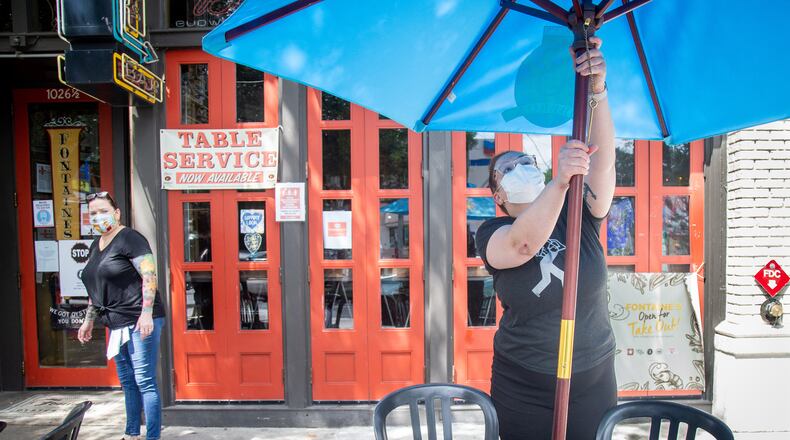Many of Stuart Meddin’s commercial tenants are struggling to pay rent on time. Two are handling the crisis in completely different ways.
Sales at Highland Tap and Fontaine’s Oyster House in Virginia-Highland have dropped 60% since COVID-19 hit in March, said owner Chip Ney. His restaurants have little outdoor seating and Highland Tap isn’t conducive to handling carry-out orders.
Ney called Meddin early in the pandemic to explain his predicament. Meddin agreed to defer a portion of Ney’s rent.
Credit: Rebecca Wright
Credit: Rebecca Wright
Three doors down North Highland Avenue, Reid Zeising closed Genki Noodles & Sushi in early July. Zeising couldn’t persuade Meddin to lower his $12,000 monthly rent, but he said it wasn’t for lack of trying.
For an increasing number of business owners and landlords, the outcome with Genki Noodles & Sushi might soon become the norm as unpaid commercial rents pile up. The issue is top of mind now since rent is due Saturday.
Federal relief loans, which thousands of metro Atlanta small businesses obtained this spring, were partly used to pay rent, but the money is running out. Sales may have rebounded for some, but hardly to pre-pandemic levels.
A proposed new stimulus package includes a relief-loan expansion, but Congress has not yet approved it. Lawmakers are also considering, but have not approved, a bill to give relief to commercial tenants who have stopped making mortgage payments.
Then there’s the uncertainty of how individual negotiations play out between landlords and tenants. There’s not much of a blueprint. The last time there was a similar situation was more than 100 years ago, when the Spanish Flu hit Atlanta.
Highland Tap’s Ney was able to forge a compromise with Meddin, his landlord. “We told him the truth and kept him informed,” Ney said. “He’s allowed us to run the business even though we couldn’t keep up with rent.”
Genki’s Zeising and Meddin had a different outcome. “My business was shut, it couldn’t have been any more extreme, and he insists on payment in full,” Zeising said.
Meddin said he tries to avoid evictions or clients leaving, but Zeising closed without giving him advance notice. “If someone leaves, it doesn’t mean another business will come in and do better than they did,” Meddin said. “Why not work with [an existing tenant] to help them do the best they can?”
Zeising said he did provide advance notice to Meddin that he planned to close.
The upheaval is a major threat to the economy. Commercial real estate contributes 18% to U.S. gross domestic product, according to the CRE Finance Council. Trepp LLC, a New York-based provider of mortgage data, forecast the default rate on commercial mortgages could soon rise to 6.5% from its current 0.5% rate.
Landlords have deferred and abated rent for months, but they’ve got financial obligations, too. Many say rent concessions can’t last forever.
“It’s not that landlords are losing patience, but that they’re losing flexibility,” said Robert Fransen, president of Coro Realty, which owns commercial properties in metro Atlanta. “Lenders are telling landlords, ‘You haven’t paid me principal in 90 days, we’ve got to get on with this.’”
Credit: Ben Gray
Credit: Ben Gray
Meanwhile, the state’s court system, where evictions are processed, is slowly returning to normal. The state Supreme Court suspended residential and commercial evictions on March 14, but reinstated litigation deadlines on July 14. Parties have the same amount of time to act effective July 14 as they did on March 14, according to Thomson Reuters Westlaw.
New eviction cases are starting to be filed. The landlord for Regal Hamilton Mill in Gwinnett County sued the movie theater operator Regal Cinemas on Wednesday, arguing that COVID-19 is not a valid reason to not pay rent.
Georgia does not maintain statewide data on eviction rates, said Bruce Shaw, a spokesman for the Administrative Office of the Courts.
Some landlords are likely feeling more pressure than others, depending on who holds their mortgage. Insurance companies and owners of commercial mortgage-backed securities are likely to be more aggressive about pushing landlords to collect rent, Fransen said. Banks can be more flexible since regulators have encouraged them to work with landlords, said Christopher Marinac, a banking analyst at Janney Montgomery Scott.
Large businesses also face potential eviction. Clothing retailers Brooks Brothers, Eddie Bauer and Gap Inc. have not paid rent for numerous locations since April, according to media reports.
CBL & Associates, which owns Arbor Place Mall in Douglasville, said in an April regulatory filing that a majority of its tenants nationwide have asked for rent deferrals or abatements, or have failed to pay rent since the pandemic hit.
“We intend to enforce our rights under our lease agreements,” CBL said.
No one knows when the pandemic will end, so many tenants are conserving cash instead of paying rent, said Shea Sullivan, an attorney at Burr & Forman who represents landlords and tenants in lease disputes.
Some landlords have been willing to work with tenants. Marty Yura, owner of Vista Yoga in DeKalb County, said his landlord, Stafford Properties, deferred part of his rent through the end of 2020.
“It’s not gratis, we have to pay back the rest of it later,” Yura said. “But it lets us continue to compensate our teachers.”
In some cases, landlords may need to think of new ways to help tenants beyond granting rent relief.
Selig Enterprises has directly assisted struggling tenants, said Chief Operating Officer Jo Ann Chitty. It showed one longtime tenant, the Colonnade restaurant on Cheshire Bridge Road, how to use disposable paper menus instead of plastic-covered menus that must be cleaned after each use. And they instructed owner Jodi Stallings how to reconfigure the parking lot to accommodate curbside pickup.
“She had never done curbside before,” Chitty said.
Landlords and tenants both need to be creative in that way, said Nellie Shipley Sullivan, a real estate attorney at Womble Bond Dickinson. Otherwise, the pandemic could force an outcome that no one wants—a landlord pursuing eviction, or a tenant filing for bankruptcy.
“You generally don’t want the tenant gone,” she said. “You want to work it out.”
About the Author
Keep Reading
The Latest
Featured






